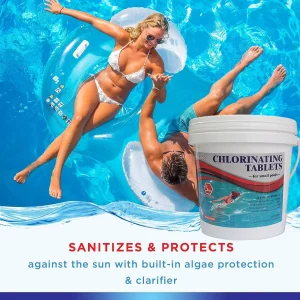Chlorine tablets play a crucial role in maintaining the cleanliness and safety of your pool by ensuring the water is free from harmful bacteria and algae. However, when these tablets do not dissolve as expected, it can lead to various pool maintenance challenges.
The Role of Water Chemistry
Water chemistry is fundamental in the process of dissolving chlorine tablets. The pH and alkalinity levels of your pool water directly impact how effectively chlorine tablets dissolve. A balanced pH level between 7.2 and 7.6 ensures optimal dissolving rates, as extreme pH levels can significantly slow down the dissolving process.
Temperature Influences
Temperature also plays a critical role. Chlorine tablets dissolve more rapidly in warmer water. Thus, during colder months, you might notice a slower dissolving rate. This is a natural occurrence due to the decreased kinetic energy in cooler water, which affects the dissolving process.
Troubleshooting Common Issues
Identifying and addressing common issues can help in ensuring your chlorine tablets not dissolving problem is resolved efficiently.

Incorrect Tablet Size
Using the wrong size of chlorine tablet for your pool’s dispenser or floater can lead to dissolving issues. Ensure you’re using the correct size as specified by the manufacturer to avoid slow dissolving rates.
Clogged Dispensers
A clogged dispenser can severely restrict water flow around the chlorine tablet, leading to it not dissolving properly. Regularly inspect and clean your dispenser or floater to ensure it’s free from obstructions.
Preventative Measures
Taking preventative measures can save you time and ensure your pool remains clean and safe for use.
Regular Water Testing
Regularly test your pool’s water chemistry to maintain the ideal pH and alkalinity levels. This not only helps in the effective dissolving of chlorine tablets but also keeps your pool water safe for swimmers.
Seasonal Adjustments
Adjust your pool maintenance routine with the changing seasons. In cooler temperatures, consider using a warmer water source to slightly increase the water temperature, thus aiding in the dissolving process.
By understanding these factors and implementing the suggested solutions, you can solve the mystery behind your chlorine tablets not dissolving and ensure your pool remains a clean, safe, and enjoyable environment.